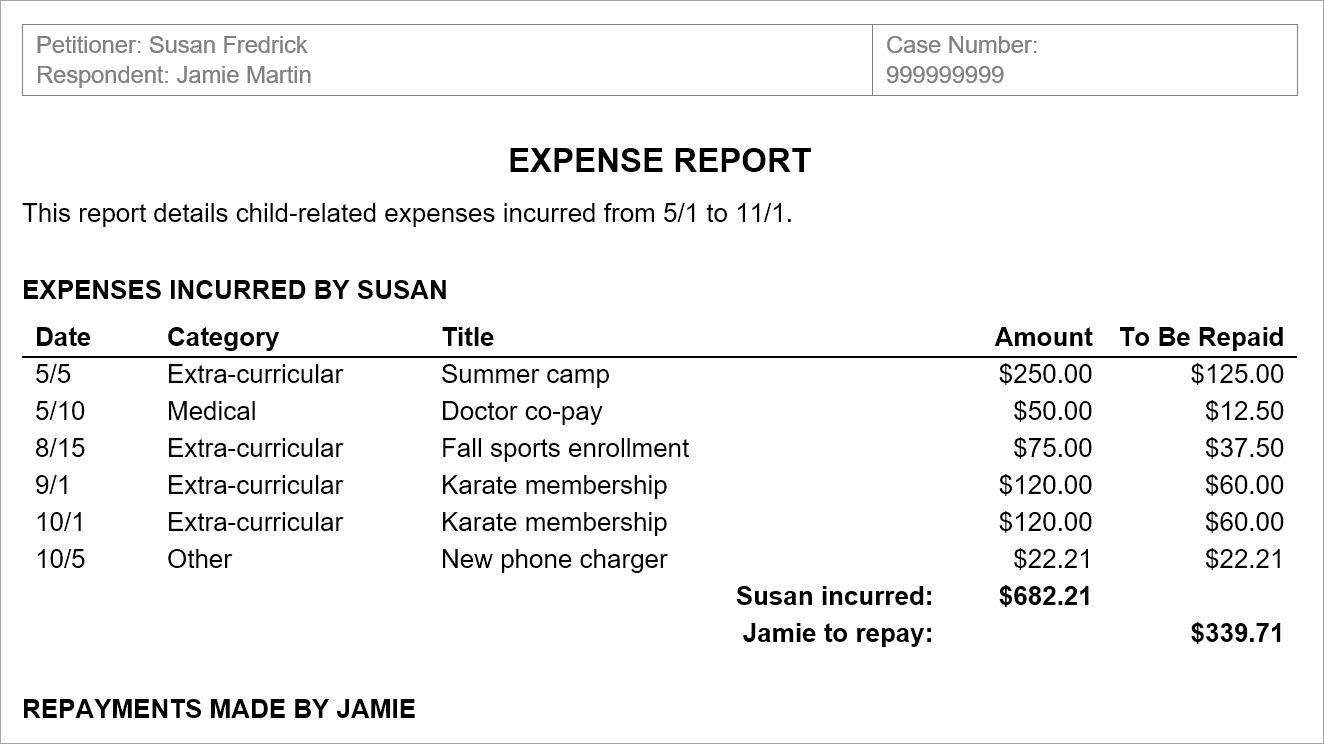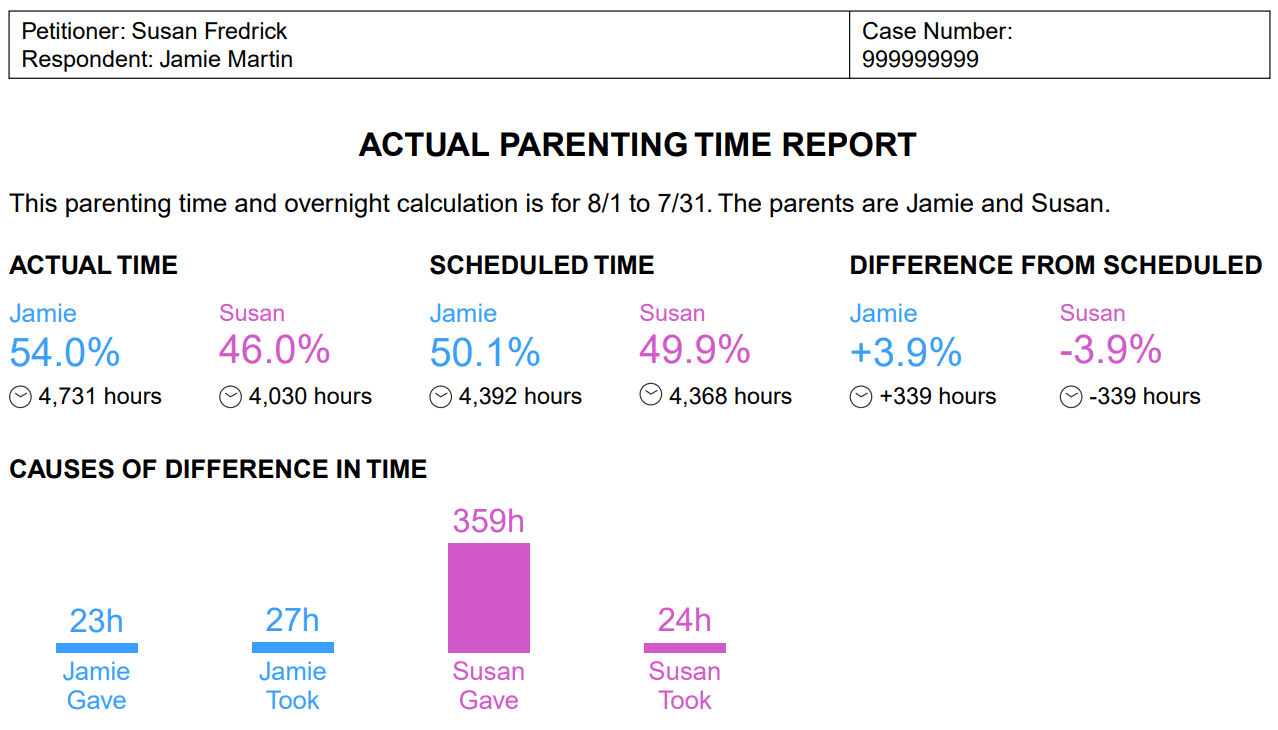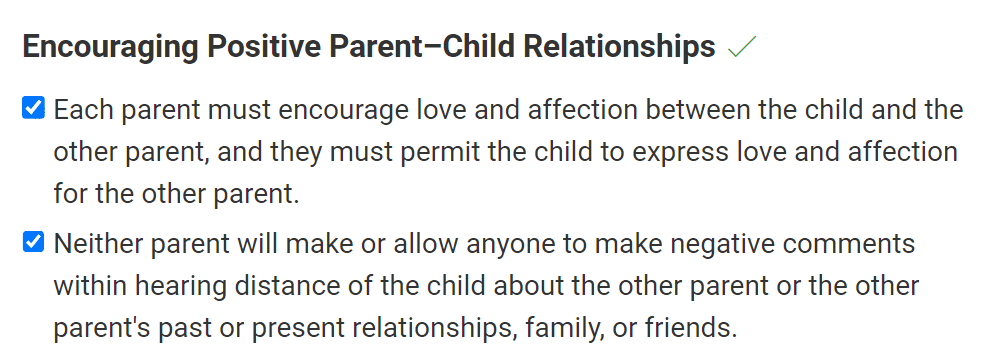Don't Use These 8 Dirty Tricks To Win Child Custody
When you and your co-parent seek a custody arrangement, prioritize your child's best interests.
Unfortunately, some parents play dirty tricks to win child custody. They try to manipulate others. They may desire sole custody because they put themselves and their desires first, not because sole custody is really better for the child.
Ideally, you should negotiate with your co-parent and reach agreement. If you can't, at least lay the facts on the table openly so a judge can decide what's best.
You don't need dirty tricks. If you're motivated to parent, you're truthful and you're well prepared for court, a court is likely to award you substantial parenting time.
1. Don't lie that the other parent poses a danger to your child
If your ex is abusive to you or the child, drinks too much or has an untreated mental illness, you can say so. That's important information in your custody case.
However, never tell lies about these matters. Dirty tricks to win child custody aren't ethical nor healthy for you, the other parent or your child. Attempting to emotionally distance your child from their other parent is called parental alienation. And in court, the judge won't be pleased if they find out you've made false accusations about serious matters.
If you or your child is truly at risk, you can seek an order of protection. A judge might order a drug test or a psychological evaluation. For your child's safety, the other parent might be limited to supervised visitation. Later, if appropriate, you might try a step-up plan to structure how the parent gradually increases their involvement. Set specific boundaries.
 You can customize this to fit your situation with Custody X Change.
You can customize this to fit your situation with Custody X Change.
To get a clearer view on what's going on in your child's life, a judge sometimes orders a professional custody evaluation. You may instead hire an evaluator privately and use their findings to settle out of court or to go to trial. An evaluation is one opportunity for the truth to come out.
2. Don't record anyone without their consent
You and your co-parent, as well as your friends and family, may agree to record your conversations for any purpose. You can analyze each other's words in therapy or mediation if that's what you both want to do.
But don't hit the "record" button secretly. Why not? Because, in many U.S. states, recording someone without their consent is illegal. In those states, you can't use nonconsensual recordings as evidence in court, and your ex could retaliate with criminal charges against you.
Write in your parenting plan that you promise not to do this to each other.
 You can customize this to fit your situation with Custody X Change.
You can customize this to fit your situation with Custody X Change.
If your ex has been recording you without your permission, consult a lawyer.
3. Don't use fuzzy math
A key approach when you prepare for a child support hearing: be honest. If you pay $229 a month for your child's health insurance, don't round up to $250. Be exact.
Record parenting expenses honestly.
 You can customize this to fit your situation with Custody X Change.
You can customize this to fit your situation with Custody X Change.
Record repayments too.
 You can customize this to fit your situation with Custody X Change.
You can customize this to fit your situation with Custody X Change.
If one parent is caught making up numbers, their behavior will hurt them in decisions about custody and visitation as well as child support. Don't be the one who does that. Be the one who keeps a detailed record of the truth, so any errors, intentional or not, can be caught and corrected.
Once the court orders you to pay support, don't try to avoid paying child support, and cooperate with the child support caseworker.
4. Don't create a false paper trail
When you have a court case, you'll gather documentation to support your position. Unfortunately, some parents create documentation just to play dirty tricks to win child custody. Don't be that person. Things not to do:
- Don't write to the other parent at an email address you know they never check, or call them on a landline when you know they've just left home or work, with the intent of making them look like they ignored your message.
- Don't forge the other parent's signatures on documents, like consent forms at the pediatrician's office, to make it look as though they made choices without your input or that they agreed with your choice.
- Don't brag on social media that you found a tutor who helped your child excel in class when it was the other parent who found the tutor.
- If your child hurts themself playing in your yard, don't make a false calendar entry to pretend your child was with the other parent that day.
When it's your ex who tends to portray you unfairly, stay on your toes.
In your parenting plan, set rules about contact methods and response times so they can't say you failed to respond to their message.
 You can customize this to fit your situation with Custody X Change.
You can customize this to fit your situation with Custody X Change.
Keep your own calendar of scheduled time and actual time so you can provide a counternarrative to any false claim they might make.
 You can customize this to fit your situation with Custody X Change.
You can customize this to fit your situation with Custody X Change.
Keep truthful records. Write them airtight so they're strong enough to resist lies.
5. Don't negotiate in bad faith
Judges commonly order parents to try mediation, and some states require nearly all parents to go. Many parents also choose to go — even before opening a court case — since it's a common way to reach agreement and avoid trial.
Mediation is especially likely to work when both parents participate in good faith. Parents' successes in mediation can be credited in large part to their willingness to listen and compromise.
Seen from another angle: If you aren't truly open to compromising, why bother going to mediation? You're wasting your time and money as well as your ex's, and your child suffers from the delay.
So don't try to skate through mediation by smiling and nodding if you secretly intend to ignore everything your ex and the mediator are saying. If you only pretend to be interested in compromise and instead you dig in your heels on your own agenda, you give up a precious opportunity to negotiate. That could backfire, since the next time you negotiate, you might be presented with a less favorable offer.
Show that you're serious about mediation by bringing a written proposal.
Try this with Custody X Change.
6. Don't coach your child to mistrust, hate or fear their other parent
If the other parent is irresponsible or thoughtless with your child, speak with them about it, directly or with a therapist or mediator. If they're narcissistic, realize when they're being selfish and trying to take advantage of you. If they don't improve their behavior, bring it up in court.
But don't point out the other parent's failings to your child. Your child can't do anything about it except feel bad about themself and their family. One parent shouldn't try to turn their child against the other. This is known as parental alienation.
It's in your child's best interest to have a relationship with both parents. Encourage the child to have visits and phone calls, let them keep the gifts they receive, and be happy for them when they enjoy these occasions and genuinely appreciate their family.
 You can customize this to fit your situation with Custody X Change.
You can customize this to fit your situation with Custody X Change.
7. Don't use your child to get back at their other parent
If you have something to tell your co-parent, tell them in a normal way: by phone, email or text, or face-to-face during pick-ups and drop-offs. You can also message each other through Custody X Change, which has a hostility monitor to prompt you to stay civil and which lets you print the messages for court.
 You can customize this to fit your situation with Custody X Change.
You can customize this to fit your situation with Custody X Change.
Most child psychologists, as well as most family courts, discourage using the child as a messenger between parents. The child doesn't want to be in the middle of an argument, and using the child this way can cause accidental or even intentional miscommunications.
If one parent tells the child to make a certain statement, then lies to their ex that they told the child to say something else, they're using the child for an unethical purpose. It's unfair to the child.
Write in your parenting plan that you pledge not to do this.
 You can customize this to fit your situation with Custody X Change.
You can customize this to fit your situation with Custody X Change.
8. Don't withhold your child from their other parent
If your child's other parent wants to be actively involved in the child's life, that's great. Even before you get a court order, cooperate with their desire to see the child. Once visits are court-ordered, you have to comply with the other parent's scheduled time.
Treat these visits as an important part of your child's life. Try to be on-time to your scheduled drop-offs, avoid rescheduling — and even consider calling the other parent before calling a babysitter.
 You can customize this to fit your situation with Custody X Change.
You can customize this to fit your situation with Custody X Change.
Don't intentionally interfere with the other parent's access to your child. That's confusing for your child, and it can land you in contempt of court.
Learn what to do if the other parent sabotages your parenting plan or kidnaps your child. Find out the child custody laws in your area.
Tools to interrupt your co-parent's dirty tricks to win child custody
You need a comprehensive parenting plan and detailed parenting time schedule when you don't trust the other parent — especially if you suspect they're playing dirty tricks to win child custody.
Creating a plan and schedule on your own can feel overwhelming. Let technology take the guesswork out of the equation.
The Custody X Change app walks you through each step of creating a comprehensive parenting plan. With it, you can easily create a parenting time schedule from templates or from scratch.
Features like the messaging center, expense tracker, parenting journal and parenting time tracker help you stay organized and document everything you need for shared parenting.
 You can customize this to fit your situation with Custody X Change.
You can customize this to fit your situation with Custody X Change.
The easiest and most reliable way to share parenting is with Custody X Change.
